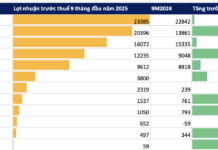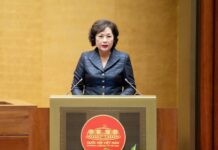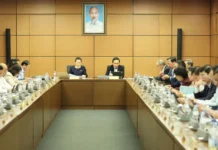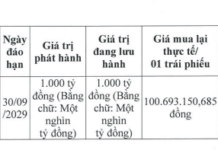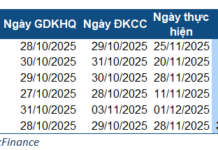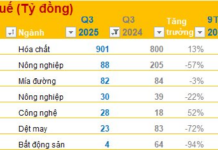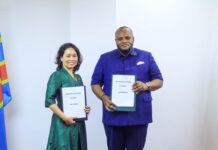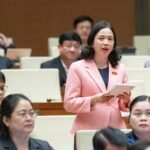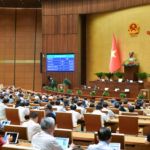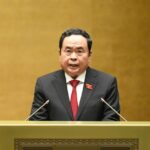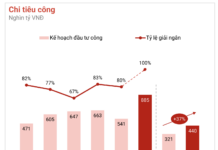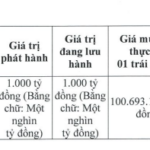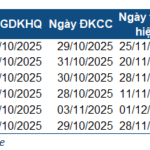Prior to the vote, the National Assembly delegates listened to the report on the explanation, reception, and editing of the draft Law on Geology and Minerals presented by Le Quang Huy, a member of the National Assembly’s Standing Committee and Chairman of the National Assembly’s Committee on Science, Technology, and Environment.
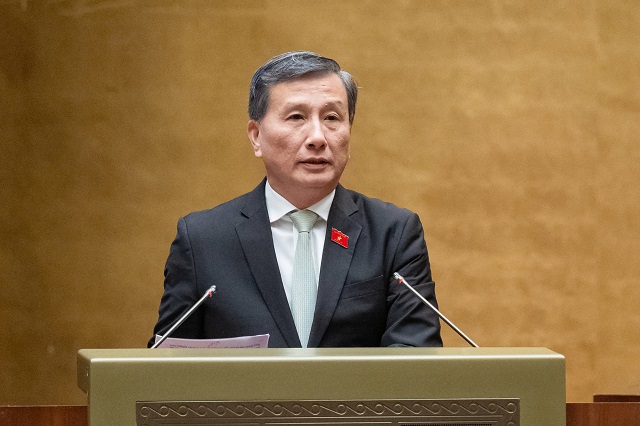
Le Quang Huy, Member of the National Assembly’s Standing Committee and Chairman of the National Assembly’s Committee on Science, Technology, and Environment
|
Regarding the classification of minerals (Article 6), the draft Law has been reviewed, supplemented, and edited in accordance with the delegates’ suggestions. This includes regulations related to this type of mineral in the provisions on state policies (clause 3, Article 3), exploration of strategic and important minerals (Articles 41, 44, and 47), and exploitation of strategic and important minerals (Article 65). It also includes the exclusion of auctions for mining rights in certain areas of strategic and important minerals (clause 2, Article 100) and the authorization of the Ministry of Natural Resources and Environment to submit the list of strategic and important minerals to the Prime Minister for approval (point b, clause 2, Article 107).
Explaining the delegates’ opinions on the rights and responsibilities of local communities, residents, households, and individuals in areas where geological and mineral resources are exploited (Article 8), the National Assembly’s Standing Committee found it necessary to provide clearer regulations on this matter. Accordingly, point d, clause 1, Article 8 has been added to the draft Law, stating that based on the mineral activities in the province, the Provincial People’s Council will decide on the issuance of regulations regarding the financial contribution of organizations and individuals involved in mineral exploitation. This contribution aims to invest in the upgrading, maintenance, and construction of technical infrastructure and environmental protection works in the area. Additionally, clause 3, Article 8 has been added to assign the Government to provide detailed guidelines on principles for determining the amount of collection, procedures for collection and payment to the state budget, as well as the management and use of the collected funds to ensure uniformity across the country.
According to the above regulations, the decision on the amount to be collected must be based on the situation and effectiveness of mineral activities in the province. In cases where mineral activities in the province are not effective, the Provincial People’s Council will proactively decide to adjust this contribution to avoid negative impacts on the local investment environment. Moreover, mineral activities often face opposition from local residents due to their undesirable effects on the living environment and technical infrastructure. By having the organizations and individuals involved in mineral exploitation make specific contributions (along with the state budget allocation for upgrading, maintaining, and constructing technical infrastructure and environmental protection works), it helps to create consensus and support from the people when implementing mineral exploitation projects. Many mineral exploitation enterprises desire a specific and clear legal framework to have a basis for implementation.
Regarding the master plan for Group I minerals, the master plan for Group II minerals, and the management plan for geology and minerals (Article 12), the draft Law has been amended to rename the master plan for minerals in clause 1, Article 12 as the master plan for Group I minerals and the master plan for Group II minerals to ensure brevity and comprehensiveness. Simultaneously, the name of the master plan has been reviewed and edited consistently throughout the draft Law. To ensure the unity of the legal system, the National Assembly’s Standing Committee has directed the editing of the name of the master plan for minerals in the content of the Law on Planning in the draft Law amending and supplementing a number of articles of the Law on Planning, the Law on Investment, the Law on Investment in the form of Public-Private Partnership, and the Law on Bidding.
Taking into account the delegates’ opinions, the draft Law has been edited to exclude specific regulations on the adjustment of the master plan for minerals. Any adjustments to the provincial master plan (including the management plan for geology and minerals), the master plan for Group I minerals, and the master plan for Group II minerals must comply with the Law on Planning (clause 4, Article 12). Additionally, the National Assembly’s Standing Committee has directed the editing of the content on adjusting the master plan following a streamlined procedure in the draft Law amending and supplementing a number of articles of the Law on Planning, the Law on Investment, the Law on Investment in the form of Public-Private Partnership, and the Law on Bidding.
Concerning the principles for granting mineral exploration licenses (Article 43), the draft Law has been supplemented with point h, clause 1, which states: “Each organization or individual is granted no more than 05 exploration licenses for one type of mineral, excluding expired exploration licenses. In case of granting more than 05 licenses to the same organization, the approval of the Prime Minister must be obtained in writing.”
Regarding mineral exploitation licenses (Article 56), there were suggestions to adjust the license period to a maximum of 50 years and the extension period to a maximum of 15 years. On this matter, the National Assembly’s Standing Committee would like to report that minerals are public assets, and the implementation of mineral exploitation projects requires a different approach compared to typical investment projects. While it is important to provide convenience to organizations and individuals involved in mineral exploitation, it is also necessary to consider minimizing potential negative impacts on socio-economic development. International experience shows that mineral exploitation licenses are typically valid for a maximum of 30 years and can be extended for a few years. This regulation is also practical, considering that after 30 years, the technology used for mineral exploitation is often outdated and requires investment in renewal.
Point a, clause 4, Article 56 of the draft Law stipulates that mineral exploitation licenses are valid for a maximum of 30 years and can be extended multiple times, but the total extension period should not exceed 20 years, resulting in a total of 50 years, which is consistent with the duration of a typical investment project as prescribed by the Law on Investment. In reality, many projects complete their mineral exploitation within 10 years. Additionally, the draft Law provides for the re-issuance of mineral exploitation licenses in cases where the license has expired (including the extension period) but there are still reserves. Therefore, the National Assembly’s Standing Committee requests the National Assembly to maintain the provisions on the duration of mineral exploitation licenses as stated in point a, clause 4, Article 56. At the same time, the Standing Committee requests the Government to provide guidance to ensure convenience and simplicity in the license extension procedures.
Unlocking Vietnam Airlines’ Troubles: A Strategic Approach
On the afternoon of November 25, the National Assembly will hold a discussion on solutions to continue overcoming difficulties caused by the COVID-19 pandemic and enable Vietnam Airlines’ early recovery and sustainable development.
The Housing Act: Governing the Real Estate Market and Social Housing Development
On November 23rd, as part of the 8th Session of the National Assembly, a resolution was passed to “Continue enhancing the effectiveness of policies and laws related to the management of the real estate market and the development of social housing.” This session was presided over by Vice Chairman of the National Assembly, Nguyen Duc Hai.
“Streamlining the Organizational Structure of the National Assembly’s Agencies”
Chairman of the National Assembly Tran Thanh Man appointed Head of the Steering Committee for Innovation and Organization of a Streamlined, Effective, and Efficient Apparatus at the National Assembly, the Agencies under the Standing Committee of the National Assembly, and the Office of the National Assembly.






